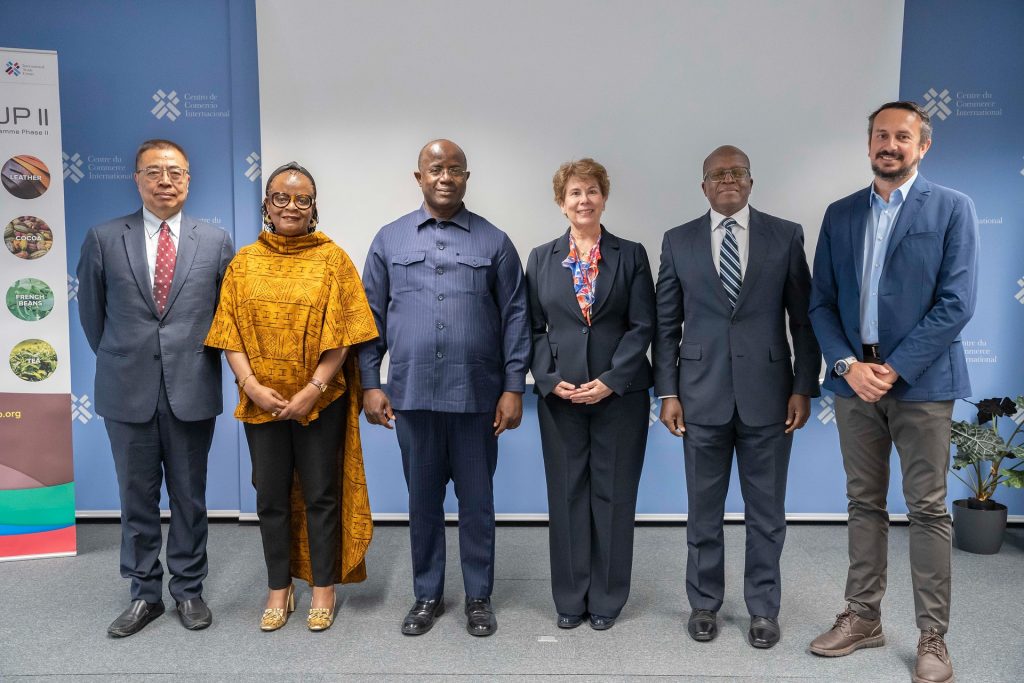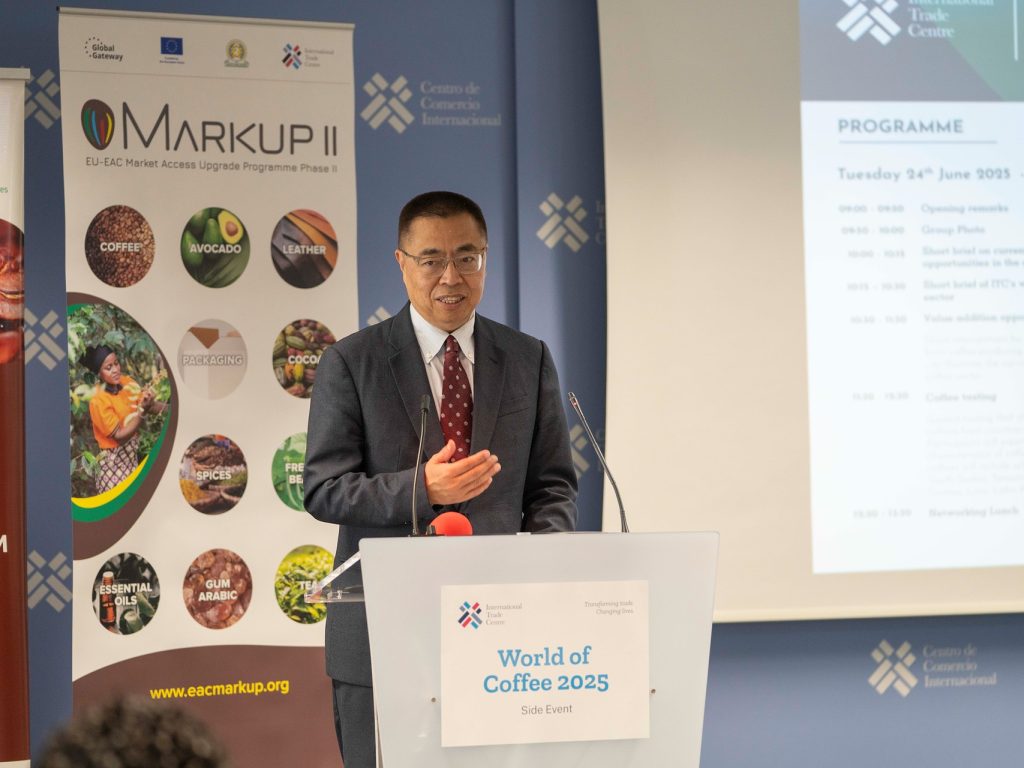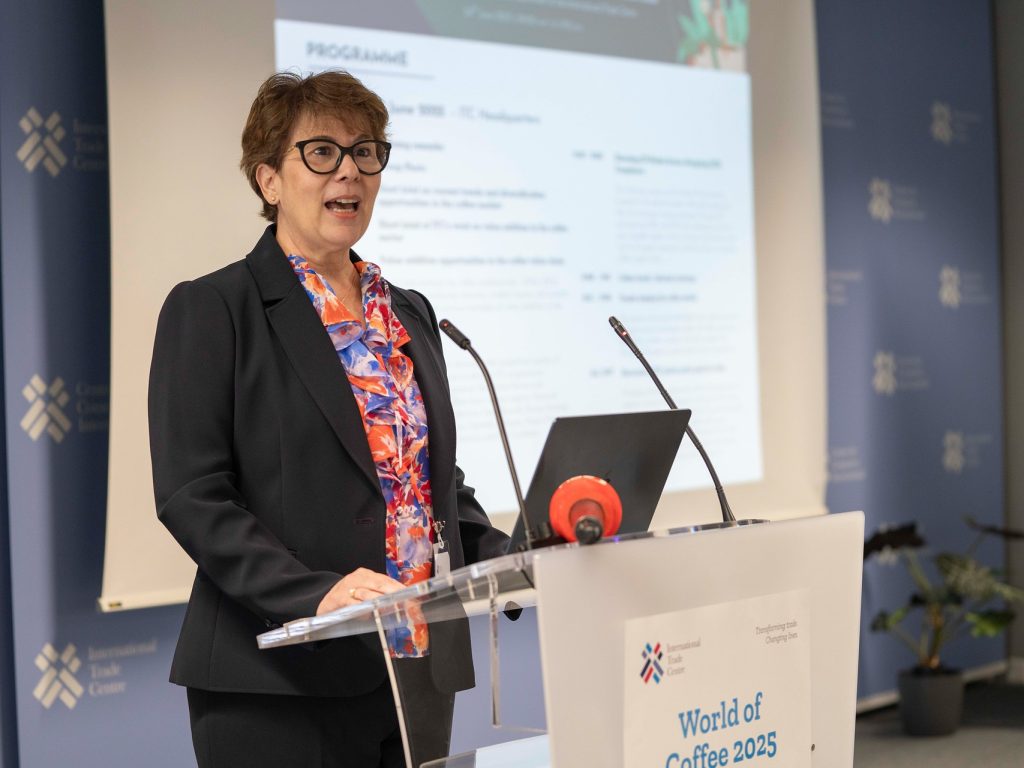
Africa’s Coffee Renaissance: Uganda’s Export Boom and the Global Shift in Value Addition at World of Coffee Geneva 202
Africa’s Coffee Renaissance: Uganda’s Export Boom and the Global Shift in Value Addition at World of Coffee Geneva 2025
Geneva, Switzerland, 24 June 2025 – In a historic moment for Africa’s coffee sector, Uganda has emerged as the continent’s leading coffee exporter, setting unprecedented records in May 2025 by surpassing Ethiopia with 47,606.7 tonnes of coffee. This milestone, which saw a 43.59% year-on-year increase and pushed annual export values past USD 2 billion, is a testament to Uganda’s relentless drive for quality and value addition.
The transformative achievements of Uganda’s coffee sector are further bolstered by the collaborative spirit among key East African nations. As part of the EU-EAC MARKUP II project—funded by the European Union in partnership with Rwanda’s NAEB, Burundi’s ODECA, Kenya’s Coffee Directorate (KCD), Tanzania Coffee Board (TCB), and Uganda’s Ministry of Agriculture, Animal Industry and Fisheries—nearly 40 coffee companies, including five from Uganda, are set to exhibit at the World of Coffee in Geneva (26–28 June 2025). This initiative is designed to enhance the export competitiveness of small- and medium-sized enterprises (SMEs) by promoting value addition, diversification, and expanded market access on both regional and international fronts.
Key leaders and policymakers in the global coffee community have underscored the critical role of SMEs and smallholder farmers, who produce an estimated 80% of global coffee. At a side event hosted by the International Trade Centre (ITC) on 24 June 2025, distinguished voices highlighted that empowering these players is essential for building resilient, inclusive, and sustainable agro-industrial value chains.
WTO Deputy Director-General Xiangchen Zhang remarked, “At the WTO, we see every barrier removed as a seed for growth. By empowering smallholder farmers and MSMEs—the true backbone of the global coffee chain—we are not just easing trade; we are transforming local challenges into international triumphs, ensuring that every cup of coffee carries a legacy of hope, resilience, and prosperity.”

ITC Deputy Executive Director Dorothy Tembo added, “Our dialogue today is not merely about showcasing exceptional coffee—it is about understanding the day-to-day realities of the MSMEs who drive the sector. With robust initiatives and collaborative partnerships, we’re building a future where innovation meets tradition, empowering local producers to thrive in international markets.”

Hon. Bwino Fred Kyakulaga, Uganda’s Minister of State for Agriculture, Animal Industry and Fisheries, who gave the key note address at this side event stressed Uganda’s commitment to value addition, stating, “Uganda reaffirms its ambitious commitment to transform its export trajectory—from US$50 billion to US$500 billion—through strategic value addition. Coffee will be one of the primary drivers for achieving this target, reinforcing not only our economic competitiveness but also our national transformation agenda. Additionally, Government of Uganda has set aside US$100 million to support investment in the gradual transition of the coffee sector from green bean export to both green bean and soluble coffee exports in a bid to generate more revenue and income for the farmers and the country as a whole”
In a separate meeting with Deputy Executive Director of ITC, Ms. Dorothy Tembo and her team, Hon. Bwino explored the possibility of partnership with ITC on adopting more modern agricultural practices of coffee production through science and technology transfer for sustainably increased coffee production which was positively received.
Reflecting on the entire value chain—from cultivation to consumption—the Executive Director, Ms. Vanusio Nogueira of the International Coffee Organization (ICO) stated: “From seed to cup, we are redefining the future of coffee. Today, amid profound geopolitical shifts, emerging trade channels, and the pressing challenges of climate change, our industry stands at a crossroads. We must not only preserve the rich diversity of our coffee crops but also drive innovation in every stage—from sustainable farming and regenerative land use to groundbreaking post-harvest flavor innovations that cater to a new generation of conscious consumers. By uniting industry experts, governments, and local producers, and through robust partnerships and strategic investments, we are turning challenges into opportunities, ensuring that every cup of coffee is a testament to progress, resilience, and shared prosperity.”

Collectively, these initiatives and partnerships illustrate an integrated strategy aimed at overcoming regulatory uncertainties, rising compliance costs, and environmental challenges that impact the coffee value chain. With programs such as the EU-EAC MARKUP II project and multi-stakeholder engagements spearheaded by international organizations—including the WTO and ITC—the region is positioning itself to not only maintain competitive advantage but also to lead a significant transformation towards premium, value-added coffee products.
As the World of Coffee 2025 fair unfolds in Geneva, these pioneering strategies and dynamic collaborations for a thriving sustainable coffee value chain are setting the stage for a resilient and prosperous future for the coffee sector. Stakeholders and industry participants will witness firsthand how innovation and public-private partnerships are redefining the potential of coffee trade, from the farm to the global marketplace. ENDS.
——————————————————————————————————————
For more information, please contact:
Charlotte B. Kemigyisha,
Public Relations Manager
Contact: +256757779992, [email protected]
